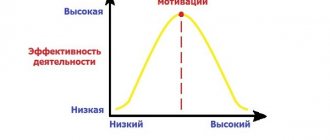What are the unconscious motives of behavior?
A motive is what causes certain actions of a person, his internal and external forces. This is why a person strives for a goal, and a goal is what he strives for.
Motives can be conscious or unconscious. Unconscious ones include: drives, hypnotic suggestions, attitudes, frustration states.
Attraction
– the need is not clear enough. A person does not understand what he wants, what his goals are. This is not so much a motive as the formation of motives for behavior. The attraction may fade or become a conscious need.
Hypnotic suggestions
may not be realized for a long time. They are artificial in nature, formed from the outside, in contrast to attitudes and frustrations that arise naturally and affect human behavior.
Installation
– a readiness formed in a person for unconscious action, for a positive or negative reaction to events, facts, perception of what is happening from a certain angle. Once developed, the attitude remains with the person for a short or long time. The rate of formation and decay of attitudes varies among people. They appear based on a person's past experiences or under the influence of other people.
In one psychological experiment, participants were divided into two different groups and given identical photographs of men. One group was told that the photo was a repeat offender, the other was a successful businessman. It turned out that all participants in the experiment were at the mercy of attitudes and described the same photo depending on what they heard. Therefore, it is recommended that if you want to express your opinion about another person, you should consider whether you are at the mercy of attitudes.
Attitudes can be useful or useless for a person and society; they are formed in the process of education and self-education. In early childhood, a child is already taught that a man should not cry, that a girl should be exemplary. And by the time a person grows up and begins to realize himself, he is already at the mercy of many attitudes, opinions, and prejudices.
Attitudes are divided into positive and negative. In a conversation, a negative attitude can be directed:
- on the personality of the interlocutor (if someone else had said this),
- on the essence of the conversation (it is unacceptable to talk like that),
- on the circumstances of the conversation (now is not the time or place for such discussions).
If you believe that your opinion may be rejected by the interlocutor, try to formulate the thought so that it is similar to the opponent’s attitude.
Frustration states
- the result of frustration. For unconscious reasons, a person can behave aggressively, blame everyone, feel worthless, guilty, inferior. Frustration can increase if a person is faced with situations where obstacles to achieving a goal are insurmountable:
- lack of external resources or internal abilities,
- losses and hardships that cannot be corrected,
- conflicts, external or internal.
If a person does not strive to master the techniques of emotional balance, his frustration will accumulate.
source
Scientific electronic library
2.2. TYPES AND CLASSIFICATIONS OF MOTIVES OF COGNITION
Motives are understood as specific motives, reasons that force a person to act, to perform actions, as well as the student’s attitude to the subject of his activity, the focus on this activity. The role of motives in the relationship are needs and interests, aspirations and emotions, attitudes and ideals. Therefore, motives are very complex formations; they are dynamic systems in which the analysis and evaluation of alternatives, choice and decision-making are carried out (Figure 2.1.).
Functions
- Encouraging . It provokes the commission of certain actions and actualizes impulses. It is unlikely that you would wake up at one in the morning and force yourself to get up if you did not feel a strong desire to go to the toilet.
- Guide . Helps you choose what type of action to take to realize your desire. This is so that you get to the toilet, and not just start relieving yourself in the room.
- Regulating . This function reflects the focus, either on satisfying one’s desires, or the team, family, etc.











